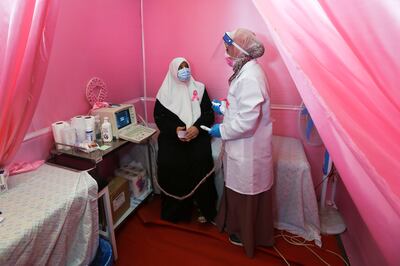A push to encourage women to check for signs of breast cancer is being made by members of the public and non-government organisations in the Gaza Strip to mark Breast Cancer Awareness Month.
This month, Aid and Hope campaign has conducted activities including ultrasound and mammography examinations for more than 150 women. All the results were negative.
Abla Aboud, 40, underwent a cancer screening as part of the campaign. She said she was afraid at first but was glad she had undergone the checks when she received her negative result.
“It makes you feel comfortable to do the examination,” she told The National. “I was hesitant at first and afraid, but I am glad I did it.”
Ms Aboud said all women should examine themselves to save worry later.
Firial Nabhan, 55, discovered she had breast cancer in 2017. She said she regrets not going for checks earlier.
“I ignored the symptoms for one year,” she said. “After that, I was diagnosed with breast cancer, which affected me so badly and I isolated myself from everyone.”
In the Gaza Strip, breast cancer accounts for 18 per cent of cancer patients. It is the most common type of cancer among women.
Women make up 33 per cent of cancer patients in the area. In Gaza, there are about 316 breast cancer cases diagnosed yearly, with a death rate of 15 per cent.

Ms Nabhan, who is from Gaza City and has five children, has begun chemotherapy but believes she needs radiation treatment, which is not available in Gaza.
“I went to Israel for treatment after spending a year and half in Gaza without results. Doctors there told me that I am late but they will do their best,” she said.
“It is not easy to be a cancer patient in the besieged Gaza Strip,” Eman Shanan, director of the Aid and Hope programme for cancer patient care in Gaza, told The National.
“Two million Gazans live in a place that does not have radiotherapy units in its hospitals. Unfortunately, 60 per cent of breast cancer cases in Palestine are diagnosed late, which decreases the chances of survival.”
Ms Shahan said the Gaza Strip has a lack of anti-cancer drugs and some equipment.
She said there are around 130 cancer cases diagnosed monthly in Gaza, with around 8,300 cancer patients diagnosed from 2014 to 2018.
“Around 50 to 60 per cent of cancer patients in Gaza need to travel abroad to get radiation and chemotherapy treatment, which is not available in Gaza hospitals,” she said.
Israel imposes restrictions on the movement of Palestinians within the West Bank and travel from there to the Gaza Strip. When travel permits are required by Israel, it can be a long process.
Denied hospital access
According to the Ministry of Health in Gaza, 60 per cent of cancer patients were denied access to hospitals due to Israeli restrictions.
Mokaram Mohammed, 59, from Gaza City, was diagnosed with cervical cancer in 2019 but the treatment she needed was not available in Gaza hospitals.
Over a year, she filed four applications with the Israeli authorities for a permit to leave the Gaza Strip, before finally getting approval and leaving Gaza in May 2020 for treatment.
“A year after my diagnosis with cancer, I got approval to travel to get treatment in a Jerusalem hospital,” Ms Mohammed said.
After several operations in Gaza, doctors told her that she needs to travel abroad to get treatment, because of the lack of options in Gaza.
“I went to hospital in Jerusalem and spent one month there,” she said. “I came back to Gaza because I could not stay for a long time as it is so expensive to stay there.
“I am supposed to go back after one month, but permission has been denied again. I keep trying but all my attempts have so far failed."





